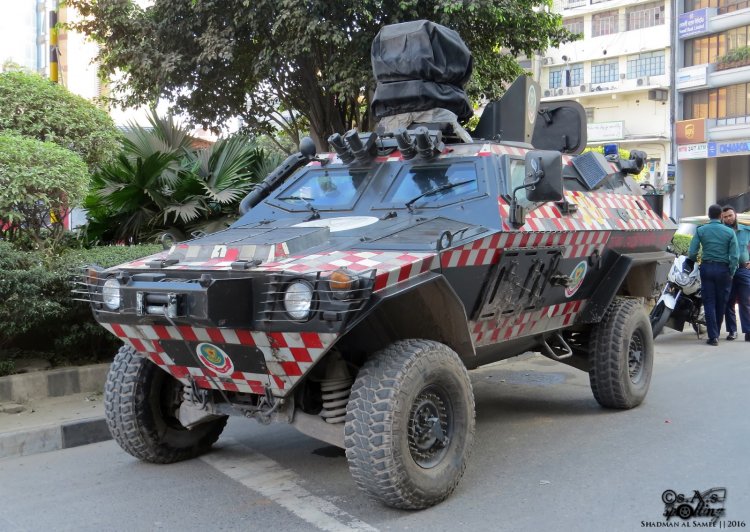Crackdown and Chaos: Unraveling Human Rights Abuses Amidst Bangladesh's Political Turmoil

04-11-2023
Alexandra Posta
East and South Asia Human Rights Researcher
Global Human Rights Defence
The recent surge in political unrest in Bangladesh, particularly the events surrounding the protests on October 28, 2023, has cast a dark shadow over the country's commitment to human rights and democratic principles. The escalating violence, mass arrests, and disturbing allegations of torture have prompted widespread concern both within Bangladesh and internationally.
Witnesses have accused the Bangladesh police of unnecessary use of force during the political protests on October 28, 2023, leading to at least 11 deaths and hundreds of injuries (HRW, 1 November 2023). The ongoing police crackdown on the political opposition, including the arbitrary arrest of thousands of opposition members and the sealing of party offices, raises serious questions about the fairness of the upcoming national elections in January 2024 (HRW, 1 November 2023). International partners, including the European Union and the United States, have expressed reservations and taken measures, such as visa restrictions and reconsideration of election observer missions, in response to the deteriorating situation (HRW, 1 November 2023 and UN, 31 October 2023).
A series of violent incidents during the protests have resulted in the deaths of at least 11 people, including two policemen, six opposition party staff members, and two bystanders (UN, 31 October 2023). Opposition protesters allegedly attacked the residences of the Chief Justice and other judges, while journalists were assaulted by both protesters and masked individuals believed to be ruling party supporters (UN, 31 October 2023). In response, the police reportedly used force, including batons, rubber bullets, and sound grenades, and raided the homes of opposition activists, leading to indiscriminate arrests and detentions (UN, 31 October 2023).
Weeks of mounting political tension, have erupted into protests and bloodshed in Bangladesh, leaving the country on edge ahead of the general elections due in January (BBC, 2 November 2023). Several senior opposition leaders were arrested, and a massive rally against the government turned violent, resulting in the deaths of at least two opposition supporters (BBC, 2 November 2023). The rejuvenated main opposition Bangladesh Nationalist Party (BNP) has intensified protests, calling for a neutral interim government ahead of the general elections, a demand rejected by the government led by Prime Minister Sheikh Hasina (BBC, 2 November 2023).
The mounting unrest in Bangladesh has given rise to multiple human rights violations. Witnesses, as documented by Human Rights Watch (HRW, 1 November 2023), report that the police excessively used rubber bullets and tear gas during the October 28 protests. The mass arrests of opposition members, numbering at least 1,500 in the days leading up to the rally, suggest a systematic effort to suppress political opposition and potentially manipulate the electoral landscape (HRW, 1 November 2023).
Allegations of torture have emerged from detainees, highlighting the need for thorough and independent investigations into all cases of abuse. The lack of convictions under the Torture and Custodial Death (Prevention) Act underscores the challenges in holding perpetrators accountable (HRW, 1 November 2023). The arrest and charging of opposition leaders under the Explosive Substances Act raise concerns about the potential misuse of legal instruments for political purposes (UN, 31 October 2023).
The arrests of senior opposition leaders, including the head of the BNP, Mirza Fakhrul Islam Alamgir, and the violent turn of a peaceful rally, further underline the depth of human rights violations in Bangladesh (BBC, 2 November 2023). The intensified crackdown on opposition party leaders and protesters signals an attempt at a complete clampdown of dissent ahead of the general elections (BBC, 2 November 2023).
In conclusion, the situation in Bangladesh demands immediate attention to prevent further erosion of democratic values and human rights. The international community, including the European Union and the United States, must assertively condemn the mass arrests and targeting of the opposition, as documented by multiple sources. It is crucial to emphasize that fair elections cannot occur in an environment where the opposition is systematically marginalized, harassed, and imprisoned. The Bangladeshi government should heed calls for restraint, investigate allegations of human rights abuses, and create conditions conducive to a free and fair electoral process. The eyes of the world are on Bangladesh, and the imperative is clear – to uphold human rights, democracy, and the principles of justice.
SOURCES
HRW. (1 November 2023). Bangladesh: Violence Erupts Amid Demands for Fair Election. Available at https://www.hrw.org/news/2023/11/01/bangladesh-violence-erupts-amid-demands-fair-election.
- (31 October 2023). Bangladesh political protests. Available at https://www.ohchr.org/en/press-briefing-notes/2023/10/bangladesh-political-protests.
BBC. (2 November 2023). Bangladesh: Political violence grips country as election looms. Available at https://www.bbc.com/news/world-asia-67282213.




 GHRTV
GHRTV 




























